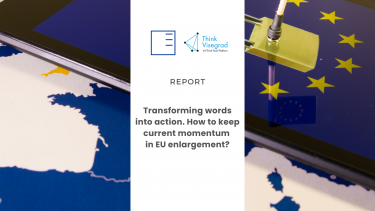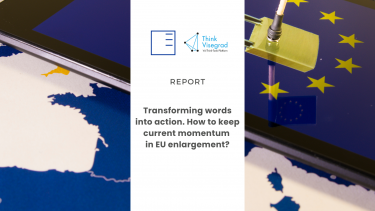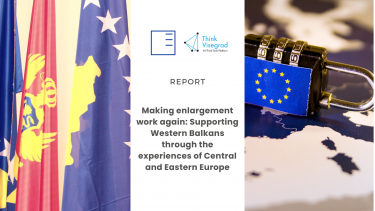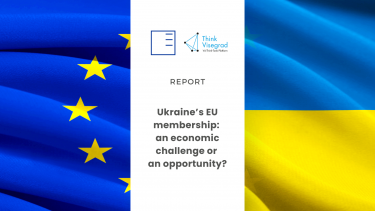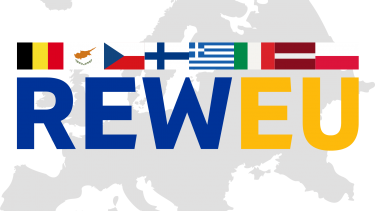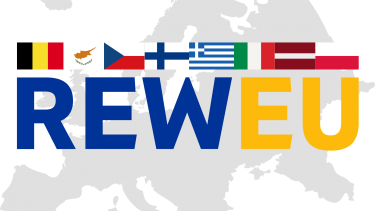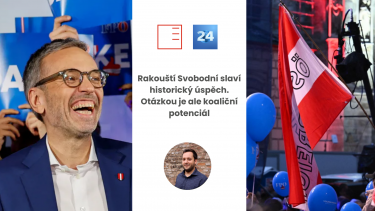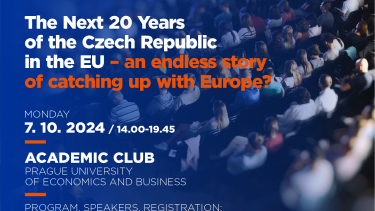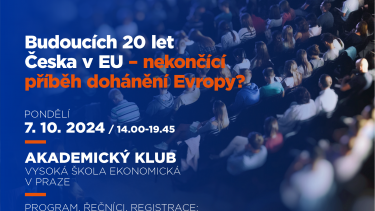Report | Transforming words into action. How to keep current momentum in EU enlargement?
On the 3rd of October, Think Visegrad in Brussels, represented by the Brussels Office of EUROPEUM Institute for European Policy, organized a discussion titled "Transforming words into action. How to keep current momentum in EU enlargement?". Experts from think tanks, diplomatic missions and EU institutions dwelled into the renewed focus on EU enlargement, including the initiation of accession negotiations with Ukraine and Moldova, the formulation of new strategies and financial incentives for candidate states, and reinforced commitments from the EU. The key challenge moving forward is ensuring that this momentum is sustained and translated into concrete, transformative actions that deliver measurable results.
Show more
Report | Proměna slov v činy. Jak udržet současnou dynamiku rozšiřování EU?
Dne 3. října uspořádal Think Visegrad v Bruselu, zastoupený bruselskou kanceláří Institutu pro evropskou politiku EUROPEUM, diskusi s názvem „Transformace slov v činy. Jak udržet současnou dynamiku rozšiřování EU?“. Odborníci z think-tanků, diplomatických misí a institucí EU se zabývali obnoveným důrazem na rozšiřování EU, včetně zahájení přístupových jednání s Ukrajinou a Moldavskem, formulací nových strategií a finančních pobídek pro kandidátské státy a posílením závazků ze strany EU. Klíčovou výzvou pro další vývoj je zajistit, aby se tento impuls udržel a promítl se do konkrétních transformačních opatření, která přinesou měřitelné výsledky.
Show more
Report | Making enlargement work again: Supporting Western Balkans through the experiences of Central and Eastern Europe
On September 12th, EUROPEUM’s Brussels Office organized a public conference titled “Making enlargement work again: Supporting Western Balkans through the experiences of Central and Eastern Europe”. Following a keynote speech by H.E. Bálint Ódor, the panel discussions dwelled on the 2004 enlargement, its impacts on the EU and the lessons learned from the process through the perspective of current EU accession of the countries of Western Balkans.
Show more
Report | Ukraine’s EU membership: an economic challenge or an opportunity?
On September 26th, EUROPEUM’s Brussels Office organized an expert discussion titled “Ukraine’s EU membership: an economic challenge or an opportunity?” The debate focused on the potential economic impacts of Ukraine’s accession to the Union, including the EU budget, sectoral policies, energy or critical raw materials. It also evaluated the opportunities for Central European countries and their private sector to strengthen the ties between the two regions. Read the full report below.
Show more
Report | Členství Ukrajiny v EU: ekonomická výzva, nebo příležitost?
Dne 26. září uspořádala bruselská kancelář Institutu EUROPEUM odbornou diskusi s názvem „Členství Ukrajiny v EU: ekonomická výzva nebo příležitost?“. Debata se zaměřila na možné ekonomické dopady vstupu Ukrajiny do Unie, včetně rozpočtu EU, sektorových politik, energetiky nebo kritických surovin. Hodnotila také příležitosti pro středoevropské země a jejich soukromý sektor a posílení vazeb mezi oběma regiony. Celou zprávu si můžete přečíst níže.
Show more
REWEU
The project (Re)uniting the East and West: Reflections on the 2004 EU enlargement (REWEU) is focused on the commemoration of the 2004 “big bang” EU enlargement at the occasion of its 20th anniversary in May 2024. This event had numerous positive effects on shaping Europe as we know it today, boosting its security, economic potential, and spreading democracy, good governance and European values across the European continent.
Show moreREWEU
Projekt (Re)uniting the East and West: Reflections on the 2004 EU enlargement (REWEU) je zaměřen na připomenutí „velkého rozšíření“ EU v roce 2004 u příležitosti jeho 20. výročí v květnu 2024. Tato událost měla řadu pozitivních dopadů na utváření Evropy jak ji známe dnes, posílila její bezpečnost, hospodářský potenciál a rozšířila demokracii, princip řádné správy a evropské hodnoty po celém evropském kontinentu.
Show moreČT24 | Austrian Freedom Party has a historic success. The question is now coalition potential
The historic success of the Freedom Party of Austria and the dramatic defeat of the ruling People's Party are the results of Sunday's Austrian National Council elections, according to the local media. The Social Democrats are likely to face another reboot and there is no room for small parties in parliament. On Monday night, the Austrian authorities officially published the results of the vote, which are being reported across Europe. Žiga Faktor, Deputy Director and head of Brussels office of EUROPEUM Institute commented for Czech TV.
Show more
Conference | The Next 20 years of the Czech Republic in the EU - an endless story of catching up with Europe?
How has the Czech Republic changed during its membership in the EU, how has it managed to catch up economically with its western neighbours? Where has it moved and where is the next potential? And does the Czech Republic have a strategy to build on? Come and listen to renowned speakers from across Europe and join the discussion on what we have achieved in the last 20 years in the EU and where we are moving as a country. We are co-organising the conference with the Prague University of Economics and Business.
Show more
Konference | Budoucích 20 let Česka v EU – nekončící příběh dohánění Evropy?
Jak se Česko proměnilo během svého členství v Unii, jak se podařilo ekonomicky dohnat západní sousedy? Kam se posunulo a kde je další potenciál? A má Česká republika strategii, na které může stavět? Přijďte si poslechnout renomované řečníky z celé Evropy a zapojte se do diskuse o tom, jakých výsledků jsme za posledních 20 let v EU dosáhli a kam se jako země posouváme. Konferenci spolupořádáme s Vysokou školou ekonomickou v Praze.
Show more
Staroměstské náměstí 4/1
Prague 1 - Staré Město
110 00
tel.: +420 212 246 552
email: europeum@europeum.org
https://www.europeum.org
